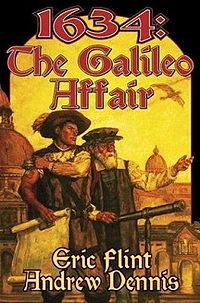1634: The Galileo Affair
by Eric Flint
Following Grantville's alliance with Gustavus Adolphus and their military successes, texts of modern-day history books of the seventeenth century have become very popular among the powerful personages of Europe and made dramatic effects and turmoil on the continent. Among those that are affected are the Holy Roman Catholic Church with their religious holdings. Father Lawrence Mazzare started the controversy by allowing Father Fredrich von Spee to read his own entry in the Catholic Encyclopedia, thereby stiffening the Jesuit's resistance to the Inquisition. Also Mazzare provided copies of the papers of the Second Vatican Council and other documents to Monsignor Giulio Mazarini, which led Pope Urban VIII to request a summary of Catholic theological reforms over the following centuries in the original timeline.
The newly formed USE acts to open a trade corridor with the Middle East via Venice to insure supplies of materials unavailable within Western Europe; gaining political allies within these regions; and religious allies to spread the doctrines of religious tolerance and the separation of church and state. Michael Stearns selects Lawrence Mazzare to lead the delegation to Venice because of his current fame (or notoriety) among Catholics. Mazzare asks Simon Jones, the Methodist minister, to accompany him as a sign of religious tolerance and Father Augustus Heinzerling. Jones goes along as Mazzare's assistant. Stearns also sends Tom Stone and his family to assist with the production of pharmaceuticals, Sharon Nichols to aid in medical education (and to give her something useful to do while she is grieving over Hans Richter's death in 1633), and Ernst Mauer to advise on public sanitation. Lieutenant Conrad Ursinus is sent as the naval attaché and advisor on shipbuilding and Scottish Captain Andrew Lennox is assigned as the military attaché and commander of the Marine Guard. Lieutenant Billy Trumble is sent as XO of the Marine escort as well as sports advisor. However, the delegation is opposed by the French embassy in Venice led by Claude de Mesmes, comte d'Avaux, who is given orders by Cardinal Richelieu to disrupt trade negotiations between the USE and Venice.
